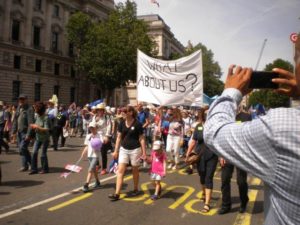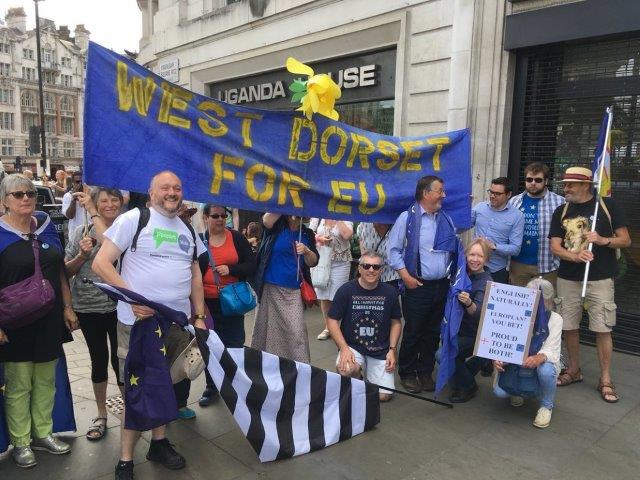You may have seen West Dorset 4 EU in Dorchester, Bridport and Weymouth (next stop Blandford) running a street survey using their ‘Brexitometer’, with people queuing up to answer some simple Yes/No/Don’t know questions:
Is Brexit going well?
Brexit will be good for jobs?
Brexit will be good for the NHS?
We need a People’s vote on the final deal
Brexit supporters were as keen as EU supporters to add their opinions and the Brexitometer prompted a lot of in-depth conversations between Leavers and Remainers. But each time the Brexitometer appeared it was clear that more and more people were becoming worried about what leaving the EU would really mean for all of us, as individuals, as families, as citizens of a divided, stressed and puzzled country.

This agreed with recent polls that have shown that more people would now vote to Remain rather than Leave. Even more important (also agreeing with polls), the Brexitometer showed that the majority of people wanted us, the citizens, to have a vote on the final Brexit deal. It is a given that Remainers will not be happy with any Brexit deal, but as one important issue after another appears, issues that May’s Brexit team has simply not thought of, let alone it being a problem, it is becoming clear that many Leavers also will not be happy with whatever deal emerges.
We hear a lot about ‘the democratic will of the people’ being honoured. That democratic will must surely include the opportunity for Leavers, as well as Remainers, to vote on the final deal. Given the appalling incompetence of our negotiators, and the government’s efforts to block Parliament’s say in the matter, democracy really does demand that ‘we, the people’, have a say.
Which is why the People’s Vote campaign came into being. A coalition of every pro-EU group except that funded by George Soros (a billionaire ‘philanthropist’ with a record of interfering in other countries’ politics) was formed to campaign for such a vote. This time, they argue, the people who are now far better informed about all the issues involved should decide what happens. It is, after all, our country’s future and our individual futures that will be affected. And this should not be a simple Yes/No vote that divides the country yet again, but a thoughtful, informed electorate choosing between several options.
So, on Saturday June 23rd, 2 years after the EU referendum, the People’s Vote organised a march in London, and what a march it was. They wanted it to be big. 2 days earlier they were hopefully estimating a turnout of 40-50 thousand people. What they got was over 100,000, a number that has not been disputed by the police or the media. Among them was West Dorset for EU
For those of us taking part in the march, it was difficult to tell just how big it was; we could only see our bit of it, read the placards close to us. And, of course, the majority were home-made, with people’s personal messages – rude, angry, funny, politically pointed and informed. One affected me deeply. Painted in large black letters on a piece of white sheeting was the stark question: WHAT ABOUT US?

What indeed? It gave a voice to the quiet despair that many people are now experiencing about Brexit.
People had come from all over the UK, with groups from Wales and Scotland; people representing Northern Ireland (both Scotland and NI voted to remain) were there. That Northern England Brexit stronghold had people marching under a banner reading “The North East Loves EU”. EU citizens living in the UK were there. British citizens living in the EU had travelled to London to support the march. People who had never been on a march before were there. Babies, the very old, and every age between, we were all there.
There were MPs from all the parties there despite infighting and arguments. The Tories, whose referendum this really was, are working hard to keep their party together instead of putting the needs of the country first, but that didn’t stop Tories from marching. For Labour it’s a divide between the leadership and the members, the majority of which back Remain. And yes, as gleefully reported by the media there were anti-Corbyn Labour people chanting “Where’s Jeremy Corbyn?” (he was visiting refugee camps in the Middle East) But the chant was short lived; the marchers gave it little attention. They were there for other reasons.
Groups and families turned out to march. Some people had come alone only to find they were among instant friends. And although Parliament Square, where the march ended, was filled to bursting with marchers waving their banners and listening to speeches, for many it was simply being on the march that counted, their presence on the streets that meant something. They didn’t need speeches so, having completed the march they went home.
As did I, but not before I had walked back to Pall Mall, where the march had started, looking at all the placards and banners and wondering where the end of the march was. And – I may be biased here – but nowhere did I see such a splendid and noticeable home-made banner as that from West Dorset!
There’s a lot to be said for the feeling of solidarity generated by such an event. And it is a great boost for those who want to stay with the EU, feeling horrified at the incompetence and arrogance displayed by the Ministers negotiating with the EU, and despairing at the possibility of crashing out with no deal at all.
Apart from all the unresolved issues such as the Northern Ireland border, I wondered just what this was doing for our country’s global reputation. I thought it couldn’t get much lower. But it could. In the middle of all the ‘negotiations’, while the UK demands all the privileges we have as an EU member even though we’re leaving, and the EU responds by saying, over and over (and no, that is not ‘bullying’ us) that the regulations, which we signed up to, do not allow us to have what we demand – in the middle of this we have two very English scandals: the Grenfell fire that killed 72 people and Windrush.
The Grenfell fire was due to a posh Tory Council happily cutting corners and saving money on their unwanted social housing – or rather their unwanted tenants. In the Windrush scandal we discovered that the Home Office, under the dictat of our current Prime Minister, was busily and illegally deporting people who had a right to live in this country. I don’t think I am alone when I say that I felt ashamed to find myself a citizen of a country that had hidden rabid racism; a country where humanity and compassion were so often put aside in favour of money or ideology.
Brexit-supporting you may be, and you may believe in the promises of Boris Johnson and the ‘Trade’ Minister post-Brexit, Liam Fox, that we will happily and easily make trade deals with so many countries outside the EU, even though trade deals take years to agree, and we already trade with almost all of those countries via the EU. But…
Do we honestly think that those countries will want to trade with a country which is currently presenting a cruel, uncaring and racist face to the world? Do we really think it possible to reinvent our Empire or Commonwealth, where racism was the order of the day, when the rest of the world has moved on?
But then again, despite being the biggest trading block in the world and having stopped European countries fighting each other for years, there is a lot about the EU that needs reform. People all over Europe recognise that and are working to that end. Pro-EU English people like me would like to be part of that reform, not to sit isolated on the sidelines with even less voice than I have now.
Each of us, when we voted in the referendum 2 years ago, had our own very personal reasons for voting the way we did. Since then we have learnt about how we were misinformed (by both sides); we have had to learn about how the EU works; learn about issues, rules and regulations we never knew existed. In the last two years we have perhaps got rid of some sloppy thinking, become more, or less, emotional about what we are facing, perhaps reaffirmed some deeply held beliefs and tossed some ignorant assumptions and opinions out of the window.
We have had to discover things about ourselves and our country that we did not want to know, face divisions we had preferred not to notice, been made uncomfortable by some awkward home truths. We are not the same people we were two years ago. That is why the People’s Vote is so necessary.
Lesley Docksey
To report this post you need to login first.







